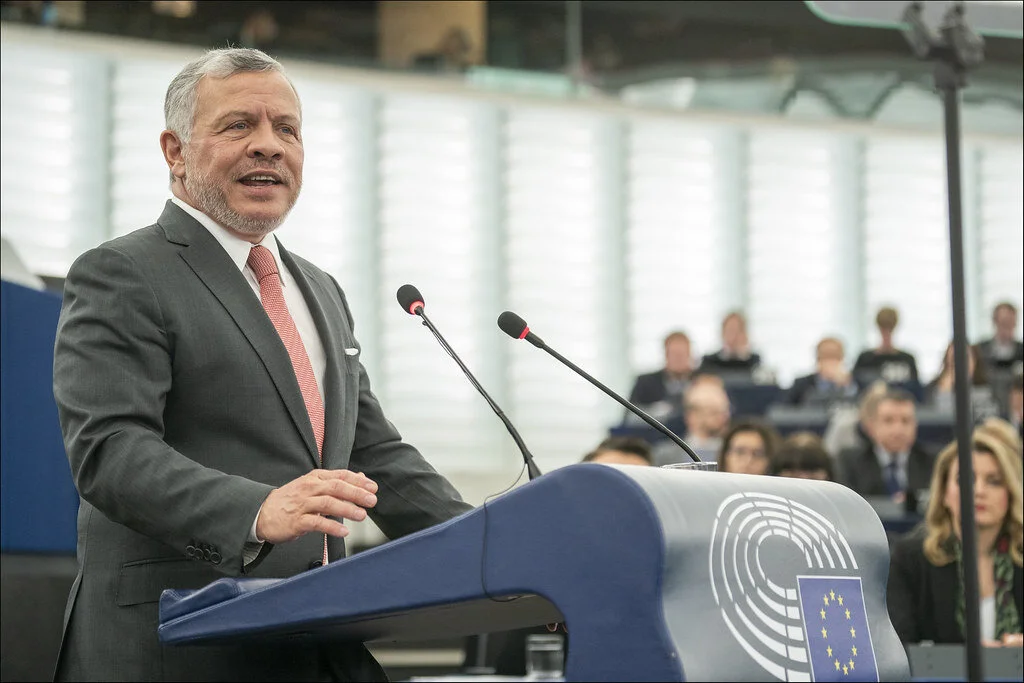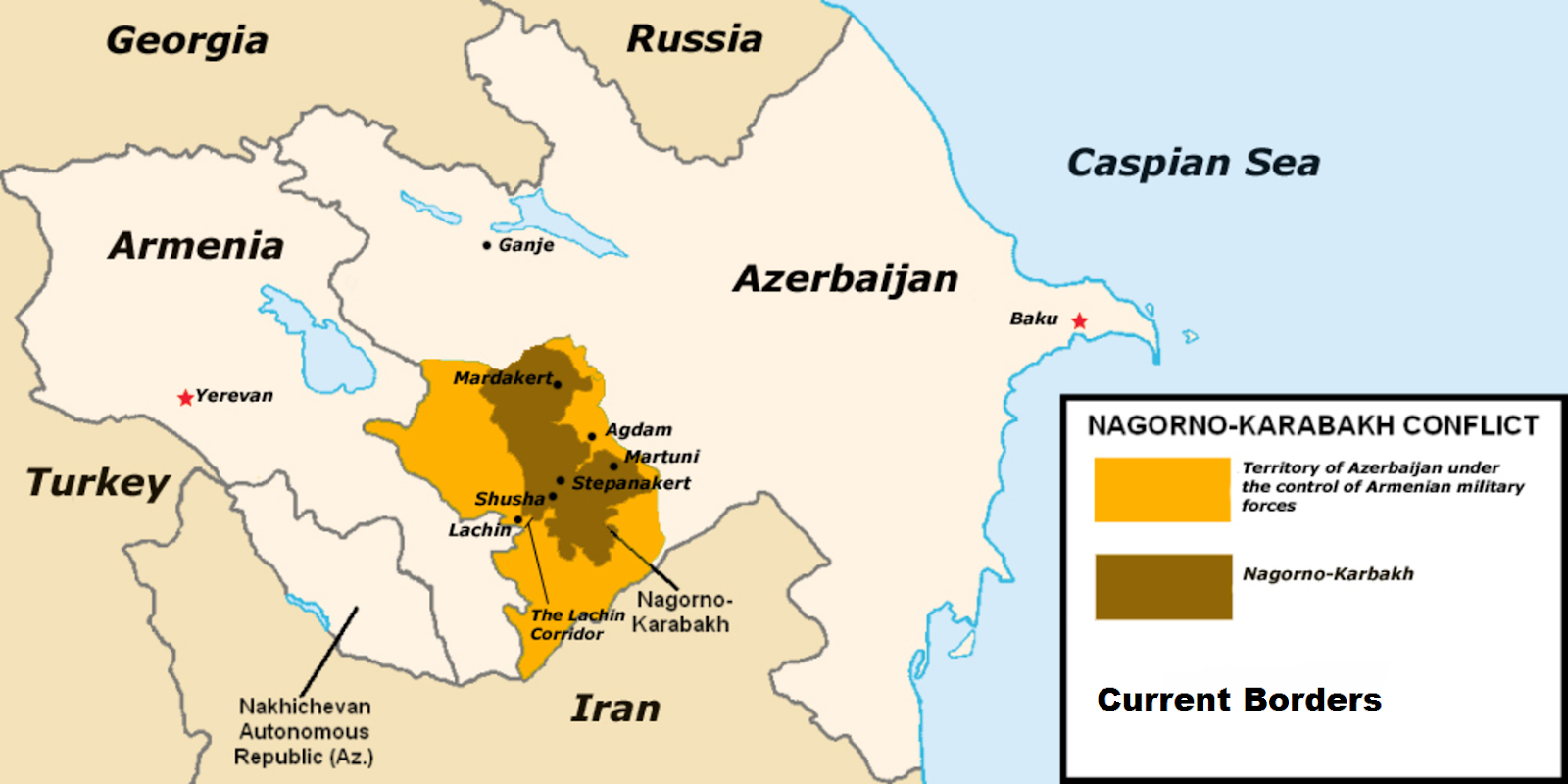On April 4, Jordan’s former Crown Prince Hamzah bin Hussein released a video through his lawyer to the BBC, which stated that he was under house arrest due to criticism he voiced toward the government. Hamzah is the half-brother of King of Jordan Abdullah II, who has been reigning since 1999. In the video, Hamzah accused the Jordanian government of “corruption, incompetence and harassment.” According to Hamzah, the government was not accusing him of making the criticism himself.
Armenia-Azerbaijan Border Is Exposed To Heaviest Fighting It’s Seen in Years
Photo courtesy of wikimedia commons
By Aditi Parashar ’22
Staff Writer
Armenia and Azerbaijan’s military forces have erupted into conflict, exposing their border to the heaviest fighting it has seen in years. The clashes began on Sept. 27, with both Armenia and Azerbaijan accusing the other of making the first move.
This conflict has been the most significant military escalation the region has witnessed since the last war between Armenia and Azerbaijan ended in 1994. Al-Jazeera reported that experts and citizens alike fear that this could end in a full-scale war. Laurence Broers, a South Caucasus expert, said in a BBC article that containing the conflict within days, as has happened previously, might not be possible due to the intensity this time around.
The decades-long conflict is centered around the battle between Armenia and Azerbaijan for control over the mountainous region of Nagorno-Karabakh, which is internationally recognized as a part of Azerbaijan but controlled by ethnic Armenians.
The tensions in the region began in 1988 while the two were still republics within the Soviet Union. As the Soviet Union began to dissolve, it gave formal control of the contested Nagorno-Karabakh region to Azerbaijan, despite the region having an Armenian ethinic majority. During the time in which formal control of the region was given to Azerbaijan, Armenians made calls for the control to be transferred to Armenia; the Nagorno-Karabakh regional parliament vote showed the residents of the area wanting the same.
Central Eurasian studies expert Michael P. Croissant explains the historical background in his book, “The Armenia-Azerbaijan Conflict: Causes and Implications.” “In August [of 1987] a petition signed by more than 75,000 Armenians was sent to General-Secretary Gorbachev, pleading for the Soviet leader to ‘reattach Mountainous Karabakh to Socialist Armenia,’” Croissant wrote.
Azerbaijan took steps to suppress this separatist movement because it wanted to maintain control over Nagorno-Karabakh. After Armenia and Azerbaijan both gained independence from Moscow in 1991, the region saw full-scale war due to the conflict of interest between the two countries. This resulted in tens of thousands dying in massacres and ethnic cleansings. Mass displacement led to a severe refugee crisis and various other human rights violations. The war lasted until 1994 and ended with a ceasefire; however, “Negotiations over decades, mediated by international powers, have never resulted in a peace treaty,” reported the BBC.
Nora Cyra ’21, a double major in international relations and Russian and Eurasian Studies, said: “The recent years have seen a notable increase in nationalist rhetoric from either side of the border. Both countries have emphasized how the other is an existential threat to the people, and placed great importance on how integral the Nagorno-Karabakh region is to each country’s national identity. The increasingly strong public opinion on both sides, especially following the 2016 outbreak of fighting, is that the only resolution can come from direct conflict.”
Shanze Hasan ’21, another international relations major, also weighed in on the conflict. “One of the major factors at play here is the desire for no compromise present on both sides. Both Armenia and Azerbaijan have hardened their positions on this conflict so considerably that it leaves no room for compromise to even be considered. When the other side has been vilified to the extent we see in these two countries, even if tomorrow both the governments decided to hold talks, the result of their aggressive propaganda would be seen in their own populations’ inability to accept such a move.”
The BBC reported that the scale and scope of the conflict has surpassed the periodic escalations the border has seen over the years, this time “involving heavy artillery, tanks, missiles and drones.” Cyra explained, “Azerbaijan and Armenia have increased their own militarization capabilities in a way that has had a direct impact on the level of militarization visible at the border and thus, the willingness of both countries to engage in battle.”
Cyra, who is completing her thesis on the resolution of intractable conflicts in the former Soviet Union, further elaborated, “The changing international landscape has also led to an increased involvement of the allies of both countries which we could see result in a wider regional power conflict.”
Turkey has historically been an ally to Azerbaijan and has lent its explicit support to the Azeri government. There currently exist no diplomatic relations between Turkey and Armenia.
The other key country which could potentially get drawn into the conflict is Russia. Russia maintains relationships with both Armenia and Azerbaijan, supplying them both with weapons. However, Russia has a military base in Armenia, and both are members of the Collective Security Treaty Organization, an intergovernmental military alliance. The BBC reported, “The longer that fighting goes on, and/or if one side is seen to be losing in a more protracted struggle, the more likely it is that Russia and Turkey will face difficult choices over whether to become more involved.”


